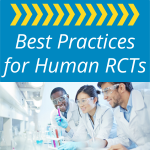
Laboratory Management and Statistical Analysis Plans for Clinical Nutrition Studies (Best Practices for Human RCTs Collection)
Human nutrition randomized controlled trials (RCTs) have unique considerations and conducting them with the highest scientific rigor is essential to the development of evidence-based dietary guidance for promoting optimal health and advancing health care. Diet-related interventions can include diet and/or behavioral manipulation, provision of foods or entire meals, or delivery of dietary components in individual food items or supplements.
Join an esteemed faculty for a training on the design and conduct of human nutrition RCTs, documentation and reporting of all aspects of clinical trial management, and data analysis and reporting of results. Course content is based on a series of articles published in Advances in Nutrition; see reading assignments below.
Reading Assignments as Preparation for Course Attendance
This course is included in the Best Practices for Human RCTs Collection.
Learning Objectives
- Describe how to develop a data analysis plan
- Explain best practices for laboratory management
- Use core principles to complete a statistical analysis and report results
Target Audience
- Faculty in graduate nutrition/obesity and related programs
- NIH-funded Nutrition Obesity Research Center members
- Graduate students and early career professionals
- Contract research organizations staff
- International nutrition societies members
- Industry scientists
- Funding agencies personnel
- Clinical research oversight committee members and auditors
This activity includes the following presentations:
Laboratory Management and Statistical Analysis Plans for Clinical Nutrition Studies
Welcome and Introductions
Penny M. Kris-Etherton, PhD, RDN,FAHA, FNLA, FASN, CLS – Pennsylvania State University
Session 1: Laboratory Management and Statistical Analysis Plans for Clinical Nutrition Studies Part 1 / Elements and Purpose of a Statistical Analysis Plan
Kristina S. Petersen, PhD, APD, FAHA – Texas Tech University
Preparing a Statistical Analysis Plan
George P. McCabe, PhD – Purdue University
Session 1 Panel Discussion
Kathryn Barger, PhD – JM USDA HNRCA at Tufts University
George P. McCabe, PhD – Purdue University
Joshua W. Miller, PhD – Department of Nutritional Sciences, Rutgers University
Connie M. Weaver, PhD – San Diego State University
Laboratory Considerations
Joshua W. Miller, PhD – Department of Nutritional Sciences, Rutgers University
Completing Statistical Analyses and Reporting Results
Kathryn Barger, PhD – JM USDA HNRCA at Tufts University
Data Management Planning and Execution
Kevin C. Maki, PhD – Midwest Biomedical Research, Addison, IL and Indiana University, Department of Applied Health Science, School of Public Health
Session 2 Panel Discussion
Kathryn Barger, PhD – JM USDA HNRCA at Tufts University
Kevin C. Maki, PhD – Midwest Biomedical Research, Addison, IL and Indiana University, Department of Applied Health Science, School of Public Health
George P. McCabe, PhD – Purdue University
Joshua W. Miller, PhD – Department of Nutritional Sciences, Rutgers University
Connie M. Weaver, PhD – San Diego State University
Highlights
Kevin C. Maki, PhD – Midwest Biomedical Research, Addison, IL and Indiana University, Department of Applied Health Science, School of Public Health
Disclosure Policy
The American Society for Nutrition supports fair and unbiased participation of individuals in its education activities. Any real or potential conflicts of interest must be identified and managed. All relevant financial relationships with commercial interests that directly impact and/or might conflict with ASN activities must be disclosed, or disclosure that no relevant financial relationships exist must be documented. Other relationships that could cause private interests to conflict with professional interests must also be disclosed. This policy is intended to openly identify any potential conflict so that participants in an education activity are able to form their own judgments about the presentation. In addition, disclosure must be made of presentations on drugs or devices or uses of drugs or devices that have not been approved by the Food and Drug Administration.
Speakers
Laboratory Management and Statistical Analysis Plans for Clinical Nutrition Studies
Kathryn Barger, PhD, JM USDA HNRCA at Tufts University
No relevant financial relationship(s) with ineligible companies to disclose.
Penny Kris-Etherton, PhD, RDN,FAHA, FNLA, FASN, CLS, Pennsylvania State University
Disclosures: Grant/Research Support: American Pecan Council, American Pistachio Growers, Hass Avocado Board, McCormick Spice Institute; Advisory Committee/Board Member: Heali, HumanN, Seafood Nutrition Partnership
Kevin Maki, PhD, President and Chief Scientist, Midwest Biomedical Research, Addison, IL and Indiana University, Department of Applied Health Science, School of Public Health
Disclosures: Consultant: Acasti Pharma Inc, Beren Therapeutics, Eli Lilly and Co., Naturmega, New Amsterdam Pharma, NorthSea Therapeutics, Novo Nordisk Pharma Inc.; Grant/Research Support: Pharmavite
George McCabe, PhD, Purdue University
No relevant financial relationship(s) with ineligible companies to disclose.
Joshua Miller, PhD, Rutgers University
Disclosure(s): Consultant: Church & Dwight Co.; Independent Contractor: Church & Dwight Co.
Kristina Petersen, PhD, APD, FAHA, Texas Tech University
Disclosure(s): Advisory Committee/Board Member: McCormick Science Institute; Grant/Research Support: McCormick Science Institute
Connie Weaver, PhD, San Diego State University
No relevant financial relationship(s) with ineligible companies to disclose.
Staff
Michelle Crispino, American Society for Nutrition
No relevant financial relationship(s) with ineligible companies to disclose.
Gwen Twillman, American Society for Nutrition
No relevant financial relationship(s) with ineligible companies to disclose.
Available Credit
- 3.50 Attendance
Learners are eligible to download a Certificate of Attendance upon activity completion. A Certificate of Attendance confirms the learner has completed the activity and does not confer any continuing education credit to the learner from ASN.
Price
This course is included in the Best Practices for Human RCTs Collection.

 Facebook
Facebook X
X LinkedIn
LinkedIn Forward
Forward